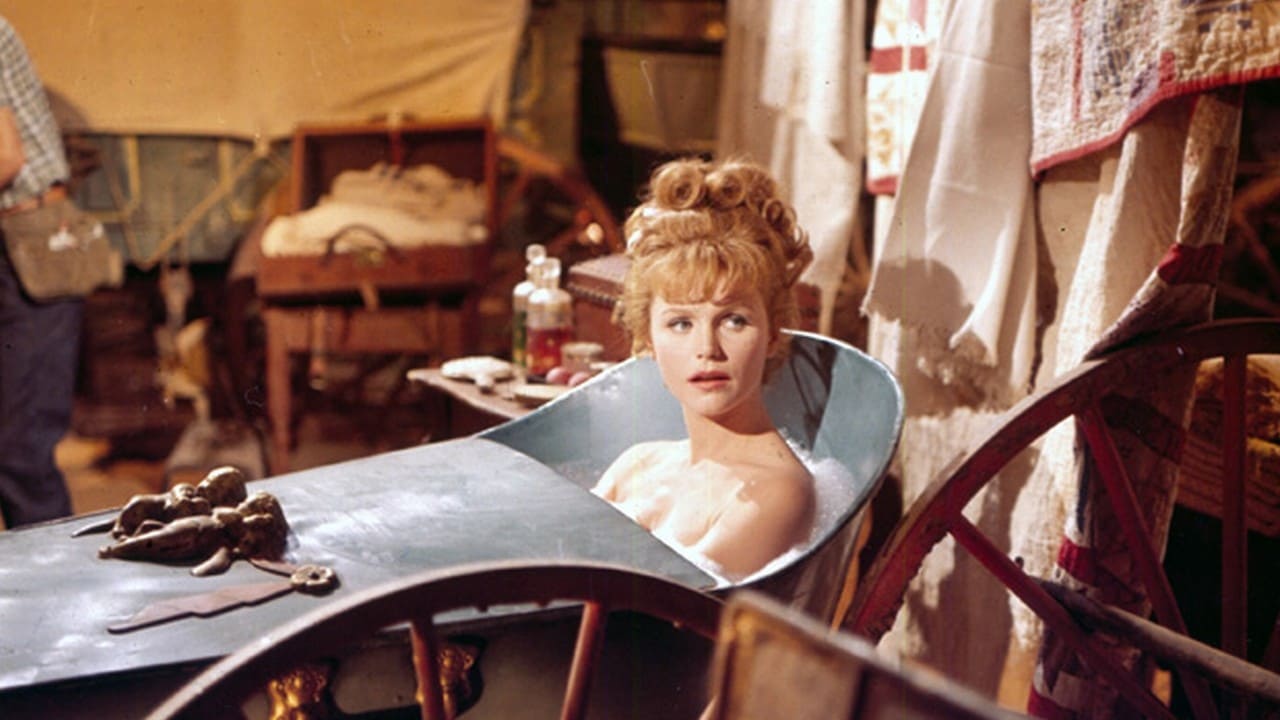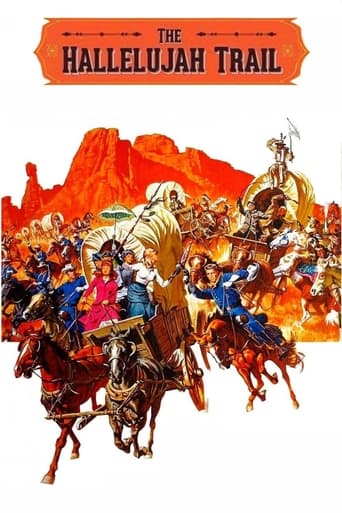

I found this little gem at a local video retailer having never heard of it before. I read the DVD cover and with the cast listing I was intrigued. On my first viewing of this film I fell in love with it and have now watched it about a dozen times. I love the concept of a Colorado town sending for liquor to help stave off the effects of what is predicted to be a hard winter. Many of the characters in this movie are funny in their own right but add them all together and you get a movie well worth your time. Sadly many of the actors are no longer with us, Donald Pleasance, Burt Lancaster and Lee Remick to name a few but they all appeared to be having a blast in this film. If you are not a fan of westerns you might like the comedy element which pokes some fun at some western clichés. I'll not give away any "spoilers" but will tell you the basic plot is the wagon train of whiskey and its trip back to Denver. Mix in ladies of the temperance movement, a tribe of native Americans looking for some fire water, the US Cavalry charged with escorting the women and whiskey to Denver as well as a local profiteer, played by Brian Keith and finally a town militia and you have the recipe for comedy. The DVD I purchased is an excellent release of this film complete with 5.1 surround sound and Elmer Bernstein's excellent musical score including entrance music, intermission and exit music and you have a fun filled viewing of a classic comedy western.
... View MoreWhen considering how to rate and reflect on some movies, one needs to consider the time at which they were made, styles and mores of that time, and decide if your mental state is ready for a movie of that type.One example would be "Pillow Talk" ... a very funny movie from the early 60s, but one which is extremely tame by the standards of the last 30 years or so.Among westerns, "The Hallelujah Trail" is another such example. The romance is tame, the violence fails to actually ever hurt anyone (a good thing), and the comedy is full of misdirection and bluster. The story and its elements are very tame by recent standards, but I never fail to be entertained when I watch this movie. I've always enjoyed one line in particular from the film, a take-off on a famous Churchhill quote (and I'm sure I paraphrase); "Never have so many bullets been fired at so many targets in such a small area with so few casualties". This after an epic battle scene involving cavalry, miners, a booze "wagon train", an Indian tribe, and a group of lady prohibition crusaders.The narration of the film adds a special touch. Its unusual but also quite funny.There is also a very talented cast in this movie, led by Burt Lancaster, and so for that reason alone it's not surprise that the film is solid and entertaining.Is it a blockbuster caliber film? No. But if you're caught in on a rainy Saturday afternoon and catch it on cable, you won't be disappointed, either.
... View MoreThe Hallelujah Trail came out in 1965, just as the traditional era of "Hollywood" movie-making was giving way to the modern era of the auteur and the independent filmmaker. In a classic big-time Hollywood production of that distant age, what wanted and got was (hopefully!) a funny story, a clever script, some big personalities for the leads and familiar character actors to support them. While Hallelujah Trail is a little long, it works if you enjoy spending a couple of hours with Burt Lancaster, Lee Remick, Brian Keith, Martin Landau, and Donald Pleasance dressing up in their Western outfits modes and having a good old time with some eye-popping stunts, hilariously pompous speeches, and cutting one-liners. .Amazingly, though Hallelujah Trail came out only a decade before Blazing Saddles, they represent comedy traditions so different that comparing them is like comparing As You Like It with The Three Stooges with The Importance of Being Earnest with Hot Shots! All different comedy animals with their own conventions and audiences. HT isn't as funny as Support Your Local Sheriff, a small scale, sharply done spoof on the same genre, but much funnier than John Wayne and Maureen O'Hara in McClintock or any the dubious comedy westerns Dean Martin and Frank Sinatra put out at the same time.The Indians in this film, unfortunately, are the drunken, amoral layabouts, played by white actors, similar to the Indians in F-Troop. This is just something you run into in old movies, and in Hallelujah Trail it is easier to overlook, as the "white" characters are made to look no less foolish.A historic note might be in order, here. Racial stereotyping wasn't a frivolous issue back in 1965. Back then a sizable chunk of the population then more or less believed in the stereotypes of Indians as either noble savages, faceless, brutal savages, or drunken, violent losers. Conventiontial portraits of Indians in film reinforced those stereotypes, adding to the burden of impoverished Amerindians trying to make a living and a life in the real world. It was also quite true that real Amerindians found it next to impossible to get work in Hollywood as anything but extras and "Indian" roles in Westerns routinely went to white actors with an "ethnic" look to them. Consequently, it wasn't "brave" to show negative stereotypes of Indians in 1965, it was what everyone else was doing and it did cause actual harm. It still does, actually, but the issue is obscured by modern jargonscolding about "insensitivity" and scoffing about "political correctness." Back in the fifties and sixties, when moral issues could be discussed without deferring to the self-indulgence of the individual, you could make a point about racism in blunter terms.
... View MoreDon't get me wrong. I grew up watching westerns and comedies, and having seen my healthy share of both, and having grown up with this film shown on various UHF channels, as well as seeing it on Sunday afternoon movie programs by network affiliates, I appreciate the film for what it is. I understand the humor, but I just don't find it all that funny.The positives; there's a lot of good stunt work, and some breathtaking cinematography of the nation's southwest. There's the signature shot of a covered wagon being pulled at full gallop over a Mitchell camera, as well as highly disciplined horses who don't bolt at the sound of gunfire.But is it really funny? The politically incorrect Indian/Firewater-humor is dated, but I don't find it particularly offensive. I just am not sure what it is that's all that funny. Donald Pleasance helps add real comic value with his inebriated clairvoyance, and some of the drunken sequences bring a smile to the viewer (the triple and quadruple exposure effect being effective), but it's not guffaw-funny.The comedic plot, especially for a western, teeters beyond being ridiculous. There's no real incentive for the characters to go and do what they're doing. It's a film about some amusing happenstance.But, the film was given enough of a budget to give it a kind of style and put enough familiar faces, locations and overall production values to make it likable by the then movie-going public.Despite its shortcomings, lack of genuine humor and high-budget gloss, I have to admit to having a fondness for it, even though I don't think it's all that good a comedy (if a comedy it all). But it's an old friend, and thus I added the DVD to my collection.If you really must see a comedic western, then do yourself a favor and buy or rent one of James Garner's excellent "Support your local Gunfighter" or "Support your local Sheriff" films.The "Hallelujah Trail" will probably leave you a little wanting in the end, but, strangely enough, satisfied in an uneven way.Watch at your own risk.
... View More